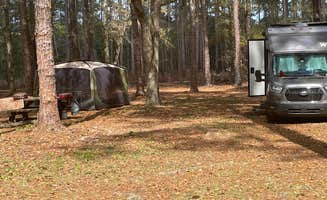Dispersed camping near Bristol, Florida centers primarily in the Apalachicola National Forest, where dense pine flatwoods and cypress swamps create an ecosystem unique to the Florida panhandle. The area experiences humid subtropical climate with mild winters and hot summers, with average summer temperatures reaching 90°F. Primitive camping in this region typically requires navigation through sandy forest roads that can become challenging during Florida's frequent afternoon thunderstorms.
What to do
**River exploration: Porter Lake Dispersed Camp offers direct water access for various watercraft. "The river is beautiful to boat or kayak and fish," notes camper Annette L., highlighting the recreational opportunities available directly from camp.
**Wildlife observation: The remote forest setting provides opportunities to witness native Florida wildlife in their natural habitat. At Porter Lake, campers report that nighttime brings "total quiet just the wildlife," creating prime conditions for wildlife spotting and night sky viewing.
**Forest hiking: The surrounding national forest contains multiple unmarked paths and official trails for day hiking. One camper at Buckhorn Hunt Camp mentions the area is "easy to find and roads in are OK," making it accessible for those seeking forest exploration opportunities outside hunting season.
What campers like
Isolation from urban environments: The remote location appeals to those seeking genuine wilderness. "Nice spot for a quick getaway from city life," reports Christin P. about Porter Lake, emphasizing its value as an "overnight getaway from the daily grind."
Uncrowded camping experience: Visitors appreciate the low usage levels, especially during certain seasons. Thomas V. notes that Buckhorn Hunt Camp remains "not all that busy outside of hunting season," providing campers with relative solitude.
Basic site amenities: While primitive, some sites offer minimal conveniences. Cliff Lake Hunt Camp provides clearings for tents and vehicles, while at Buckhorn, "four spots have a picnic table" and "spots are reasonably private," according to visitor reviews.
What you should know
Road conditions: Forest service roads in the area require cautious driving. Porter Lake Dispersed Camp is reached via F13, described as a "dirt road to campground" that connects to "other routes to any type of civilization," approximately "30 miles either way" according to Annette L.
Vehicle traffic: Despite the remote setting, certain roads experience regular use. Multiple campers note "logging trucks who use the road during the day and other vehicles" near Porter Lake, creating daytime noise that subsides after working hours.
Facility limitations: Twin Poles Hunt Camp lacks developed facilities entirely. At Buckhorn, one camper reports they "did have portable toilets but some drunk idiots smashed them," illustrating the maintenance challenges in remote areas.
Tips for camping with families
Water supply planning: No potable water exists at most sites. Porter Lake has "a water spigot" but campers note "they say non-potable but there are no signs," requiring families to bring adequate drinking water supplies.
Bathroom considerations: Toilet facilities vary significantly between sites. Porter Lake provides "vault toilets" while most hunt camps offer no facilities, requiring proper waste management planning for family camping trips.
Noise expectations: Road noise levels vary by location and time. White Oak Landing and Hunt Camp provides more distance from main forest roads, while at Porter Lake, visitors note daytime traffic noise "from the nearby bridge" that becomes "total quiet" after dark.
Tips from RVers
Access evaluation: Carefully assess road conditions before attempting RV access. Thomas V. reports Buckhorn Hunt Camp roads as "OK" but conditions vary seasonally, with sandy patches and potential flooding requiring advance route planning.
Site selection: Limited formal RV pads exist in the area. Porter Lake accommodates smaller recreational vehicles but lacks hookups, with no electricity, water, or dump facilities available.
Resource management: Self-sufficiency is essential for RV camping in these locations. Bring adequate water, manage waste appropriately, and plan for "at least 30 miles either way" to services, as noted by Porter Lake visitors.


